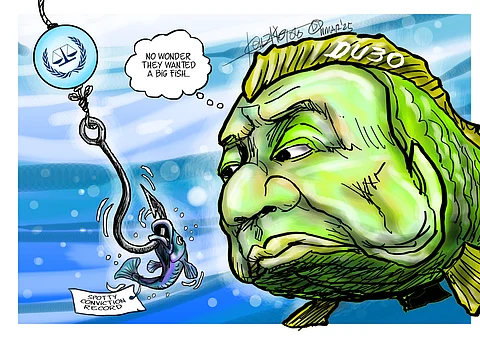
- NEWS
- the EDIT
- COMMENTARY
- BUSINESS
- LIFE
- SHOW
- ACTION
- GLOBAL GOALS
- SNAPS
- DYARYO TIRADA
- MORE

Amid the generated noise over the reported International Criminal Court (ICC) arrest warrant for former President Rodrigo Duterte, questions about its authority and hidden agenda in its moves on the country can’t be escaped.
Its pursuit of Mr. Duterte reveals the sanctimonious nature of the ICC, especially as its chief prosecutor, Karim Khan, is embroiled in a sex scandal.
Khan, a key figure in an institution tasked with upholding the highest ethical standards, faces allegations of misconduct that are currently under external investigation.
The details are murky since Khan has issued a blanket denial but the Prosecutor preaching accountability can’t shake the whispers of his personal sleaze.
The ICC thus needs a global spectacle to regain lost ground.
It also has a spotty track record as in over two decades it has secured just a handful of convictions, mostly of African warlords, while failing to nab bigger fish or prove its relevance beyond small nations or non-Western states.
The ICC, which started out as a war tribunal, is a wounded institution that is desperate for a win to silence doubters.
It had to steamroll over the question of jurisdiction and resorted to pure, unadulterated overreach.
The Philippines withdrew from the Rome Statute in 2019, a sovereign decision the ICC shrugged off with the arrogance of a court that thinks it answers to no one.
The Philippines has a functioning justice system that, while imperfect, is operational. Domestic courts, congressional probes and police investigations have all tackled the drug war killings.
Why does the ICC believe it can override a nation’s sovereignty when Manila hasn’t begged for its intervention? Duterte had railed against the Western tribunal playing god over poor nations.
Where was the ICC when US drone strikes wiped out civilians in the Middle East, or when European powers turned a blind eye to their colonial skeletons, Duterte would ask in his speeches.
The intense campaign against drugs couldn’t be conducted without blood being shed. It was a policy to address a nation’s desperation, implemented by a President who had won an overwhelming mandate on his campaign vow to eliminate the narcotics menace.
He tried delivering on what he promised. The ICC’s focus on him had little to do with accountability but a lot with a geopolitical hit job, targeting a leader who dared to defy the West’s script.
The ICC’s pursuit reeks of a strategic image repair but its gambit stands on shaky ground.
The Tribunal’s probe into alleged extrajudicial killings from 2011 to 2019, culminating in a rumored arrest warrant for Duterte, is not new. It’s been the subject of propaganda since 2018.
But the timing and intensity now is opportunistic. Duterte is a high-profile trophy, a former head of state, unapologetic and defiant, whose case could signal the ICC means business.
Unlike elusive warlords and untouchable superpowers, he’s accessible — retired in Davao, not hiding in a bunker.
Bringing him to The Hague in handcuffs could be the splashy redemption arc the ICC craves, a chance to say, “See? We can still hold the powerful to account.”
The Philippines’ functioning justice system undercuts the ICC’s complementarity principle, which says it only steps in when local systems fail.
The country is not a failed state — it’s a democracy, however flawed.
A court battered by scandal and irrelevance sees in Duterte a redemption, but through a high-stakes roll of the dice. Nailing Duterte may afford the ICC a chance to regain credibility.
The ICC’s not just after Duterte, it’s after its image.
